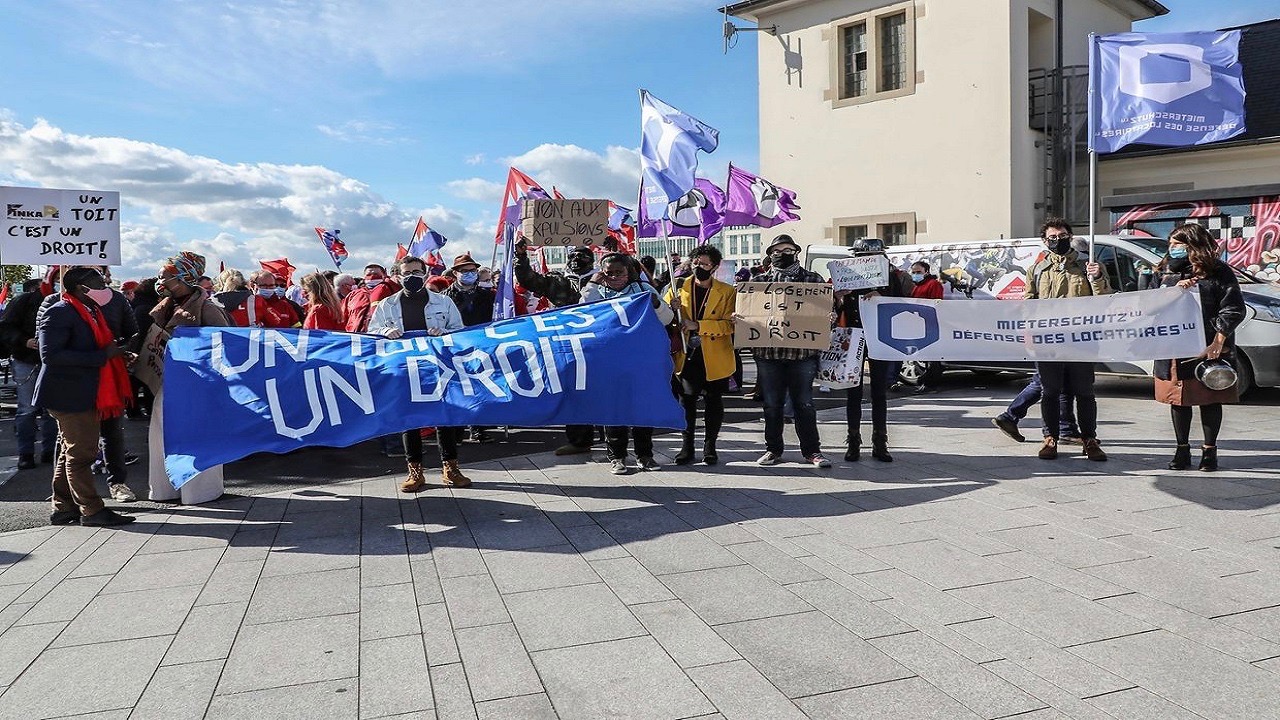Luxembourg has been witnessing an acute housing crisis caused by decades of political inaction. In the last 20 years, prices have risen steeply and the rate of increase is growing as well – from an average 5% rise 10 years ago to 10-13% in 2019 and 2020. Jean-Claude Juncker, who was the prime minister of Luxembourg from 1993 until 2013, conceded in 2005 that housing policy was the biggest failure of his government and declared that he would personally take care of the issue. He failed. The liberal-social-democratic-green government that took charge in 2013 also failed, and like what we see all across Europe, skyrocketing housing prices are common in Luxembourg too.
The specific characteristic of Luxembourg’s housing policy over the decades has been to invest a lot of money into private ownership. Every year, around 30 millions euros are given out to people who only earn the average salary or less, in order to subsidize their house loans. Also, everybody – no matter how poor or rich the person is – can get tax credit on notarial instruments for buying one house in his/her life. This amounts to around 202 million euros per year (budget 2021). The result of this owner-centric policy is that 70% of the population owns their own house. But with this policy alone, the right to housing will not be achieved in Luxembourg.
People without family property and/or with low incomes do not get the bank loan and will not have access to a lot of state aid. Public housing could be one of the solutions to tackle this problem, but the politics of the four biggest parties in Luxembourg has led to and is still contributing to a pyramid of ever-growing injustice and inequality between the poor and the rich. This is because the more you have, the more the state helps you with public money to get more. The less you have, the less help you get to access affordable housing. On the top of this pyramid, you have national and international specialized funds (FIS) that have been put together by business lawyers to develop whole parts of cities and the country. They were exempted from taxes on rental incomes until December 31, 2020 and will now look for other loopholes after they have stolen millions and millions of euros in taxes from the people every year for more than a decade (since 2007). In the second position, you find those who own between two and 100 houses and flats. Through “amortissement accéléré” (accelerated depreciation), they gain from fiscal benefits of 5% for five years (6% for six years before 2021). In many cases, this results in not paying taxes on rental incomes at all, and even worse, reduces their income tax in a lot of cases. These private housing investors get more fiscal advantages than somebody who simply owns his/her own house to live in.
Read|“Roof is a right:” Luxembourgers demand affordable and dignified housing
It is only the tenants who earn less than 2,650 euros (the minimum wage is 2,200 euros) who can get a monthly housing aid of 134 euros (for example, a single-person household). In total, this aid for the more vulnerable is only about nine million euros per year, a tiny amount compared to all the other aid and fiscal benefits mentioned above.
At the bottom of the pyramid are the most vulnerable, those ones without a steady income and no fixed work contracts. They are often excluded from renting ‘normal’ flats and are forced into the arms of housing owners who exploit them through higher rents and bad housing conditions. Part of this market is owned by the beer breweries and consists of the rooms above pubs. All these injustices are topped by the absence of sanctions on speculators who leave their flats empty to simply grow their value and contribute to the scarcity in the housing market.
Why does Luxembourg elect politicians who foster such injustice and make it impossible for normal people to find a flat in their country? One reason is that 70% of the population is profiting from this policy in the short term, even though the situation will be very tough for their children. The second explanation is that tenants were until recently not organized as they represent only 30% of the population and are often immigrants who face multiple difficulties in Luxembourg and thus getting organized is often not their first priority. Change is about to come with the recent creation of a tenants’ association, the organization of two demonstrations for affordable housing in 2020, and the coalition of about 20 organizations that have joined forces to fight the crisis together. The left parties in Luxembourg, most of all Dei Lenk (The Left) but also the Communist Party of Luxembourg (KPL), and some individuals from the social-democratic party are exerting political pressure for radical changes in the housing policies. Among the 20 organizations, it is important to mention that the biggest labor union – the Independent Luxembourg Trade Union Confederation (OGBL) – is also intensifying its efforts for affordable housing.
Political pressure is needed right now as the Green housing minister Henri Kox is about to reform several laws, most importantly one that would limit the rent tenants have to pay. But the suggested version will actually cause renting prices to freely rise with the market prices that houses are being sold for.
Gary Diderich is the spokesperson of Dei Lenk (the Left).





